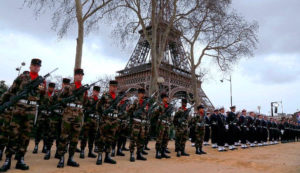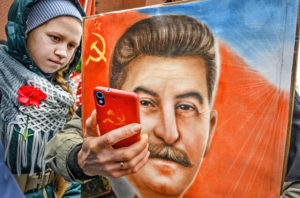Once a book-hoarder, always one. In 1899, a promising young poet and would-be revolutionary dropped out of the theological seminary in Tbilisi, Georgia. He took with him 18 library books, for which the monks demanded payment of 18 roubles and 15 kopeks. When, 54 years later, the same voracious bookworm died, he had 72 unreturned volumes from the Lenin Library in Moscow on his packed shelves. At the time, the librarians probably had too many other issues with Josef Vissarionovich Dzhugashvili, aka Stalin, to worry about collecting his unpaid fines.
Those squirrelled library loans formed a tiny part of a vast collection amassed by the Soviet dictator, estimated by historian Geoffrey Roberts at 25,000 items. Joseph Stalin’s books, as Roberts recounts in his new study Stalin’s Library, belonged to “a serious intellectual who valued ideas as much as power”. He spent a lifetime as a “highly active, engaged and methodical reader”. His tastes and interests spanned not only politics, economics and history but literature of many kinds. The book-loving shoemaker’s son from Georgia grew into an absolute ruler who deployed his library not as a prestige adornment but a “working archive”. Its bulging shelves stretched across his Kremlin offices and quarters, and around his dachas outside central Moscow.
Stalin not only read, quickly and hungrily: he claimed to devour 500 pages each day and, in the Twenties, ordered 500 new titles every year — not to mention the piles of works submitted to him by hopeful or fearful authors. He annotated with passion and vigour. Hundreds of volumes crawl with his distinctive markings and marginalia (the so-called pometki), their pages festooned with emphatic interjections: “ha ha”, “gibberish”, “rubbish”, “fool”, “scumbag”; and, more rarely, “agreed”, “spot on”, or the noncommittal doubt conveyed by the Russian “m-da”.
Stalin also drafted, wrote, and re-wrote, keenly and tirelessly — everything from Communist Party propaganda to Soviet legal edicts and textbooks in history, Marxist-Leninist philosophy and economics. He loved to edit and, as Roberts shows, he did it very well, slicing through the verbiage of sycophants to achieve greater “clarity and accuracy”. Although not an original thinker, “his intellectual hallmark was that of a brilliant simplifier, clarifier and populariser”. Robert Service, in his biography, calls the dictator “an accumulator and regurgitator” of ideas. Stalin never returned to the verse of his adolescence, but the young poet known as “Soselo” had won anthology places for the fragile tenderness of Georgian lyrics such as “To the Moon” (translation by Donald Rayfield):
Know for certain that once
Struck down to the ground, an oppressed man
Strives again to reach the pure mountain,
When exalted by hope.
So, lovely moon, as before
Glimmer through the clouds;
Pleasantly in the azure vault
Make your beams play.
Later, as a vigilant, hands-on editor, Stalin knew how to cut the theoretical waffle, keep things concrete and tell a striking story. In mass-circulation works such as the Short Course History of the Communist Party of the Soviet Union, with its 36 million copies printed in the decade after 1938, he especially liked to strike out “laudatory accounts of his own role”. He insisted that cloying hero-worship made his stomach turn. “What are people supposed to do?” Stalin asked sarcastically as he toned down the official Short Biography of himself published in 1946. “Get down on their knees and pray to me?” No court jester dared answer: “Yes”.
Of all the mind-scrambling glimpses of the despot as an “emotionally intelligent and feeling intellectual” gathered in Stalin’s Library, none quite matches the record of a Central Committee meeting, held in September 1940, about the limits of artistic expression. The General Secretary spoke up firmly on the side of freedom. “You have to let people express themselves,” Comrade Stalin argued. Artists should avoid fairy-tales that toe the party line.
Take the wonderful Chekhov, who “has no heroes but rather grey people”. Stalin approves. Even the enemies of the Soviet Union should not be depicted as monsters “lacking all human traits”. Even Trotsky — here you imagine stifled intakes of breath around a smoky Kremlin chamber — was a “capable person” who must be shown with all his “positive qualities”. Was a capable person: just a couple of weeks earlier, Ramón Mercader had, on Stalin’s orders, buried an ice-axe in Trotsky’s skull in Mexico City. Thus putting a definitive end to his character development, positive or negative.
How many other people did Stalin kill? If Cold War-era historians such as Robert Conquest laid 15-20 million deaths at his door (in The Great Terror), post-Soviet research has led scholars such as Timothy Snyder to suggest a revised estimate of between six and nine million (Bloodlands). Even the lowest figure freezes the imagination. For almost a century, allies, enemies, victims and a wondering posterity have struggled to understand how this gigantic annihilation of life and hope emerged from the ideas and deeds not of a “psychopath” — Roberts rightly rejects the term — but a shrewd, calm, widely-read and thoughtful politician-manager who had learned both to “rationalise and abstract himself from his terrible rule”. Trotsky lies dead in a Mexican morgue. A shame: such a smart guy…
Stalin, then, presents a challenge to anyone who claims a specific link between deep reading and the pursuit of ethical or social virtue. Learning nurtures wisdom in many ancient traditions. But the years since the millennium have seen a small explosion in research that tries to prove a non-trivial link between consistent reading and the empathy that allows us to inhabit other souls and walk a verst (or many) in their shoes. If literature doesn’t exactly make you better, runs the refrain of many experimental papers in psychology and neuroscience, then regular exposure to it — especially fiction — will enhance those social skills that demand an understanding of the world perceived through other eyes.
“Specifically, engaging with narrative fiction and mentally simulating the social experiences represented may improve or maintain social skills, especially skills of empathy and social understanding,” reports one widely-cited Canadian paper from 2009, referenced in the back-up materials for World Book Day (celebrated on 3 March). Toronto novelist-psychologist Keith Oatley, one of its authors, has emerged as a leading champion of reading as an empathy shot. (Interestingly, his University of Toronto co-researchers on that paper included Jordan B Peterson, later to find wider fame elsewhere.)
A survey of the evidence from 2016 affirms that “Readers of fiction score higher on measures of empathy and theory of mind (ToM) — the ability to think about others’ thoughts and feelings — than non-readers, even after controlling for age, gender, intelligence and personality factors”. The World Book Day outreach projects aim to put books into non-readers’ hands, on the basis that “Reading for pleasure is the single biggest indicator of a child’s future success — more than their family circumstances, their parents’ educational background or their income.” Here, empathy as social asset takes a back seat as voluntary reading becomes a sort of educational superpower.
Stalin, by the way, did read plenty of fiction, drama, poetry and narrative history in addition to political and economic analysis. He loved the novels of Émile Zola, made writer Maxim Gorky the most fêted private citizen in the USSR, and ran the Stalin Prizes for creative writing from his own office. Dmitry Shepilov, Pravda editor and court intellectual, later wrote that Stalin “was probably better prepared for the meetings than anyone else”. Sinister tales abound of his creepily close-focus attention to the literary arts in Soviet Russia.
One of the best known, not mentioned in Roberts’s book, concerns the arrest and persecution of the poet Osip Mandelstam. In 1934, Stalin phoned the detained poet’s friend, Boris Pasternak. “Mandelstam’s case is being analysed”, Stalin reassures Pasternak:
“Everything will be worked out. Why haven’t the writers’ organisations come to me? If I were a poet and my friend had fallen into disgrace, I would climb the walls to help him.”
Then Stalin dons his critic’s hat to ask “But is he or is he not a master?” Pasternak replies “That’s not the point!”, and requests a meeting. But Stalin hangs up. In the event, the Kremlin Mountaineer — the title of Mandelstam’s famous anti-Stalin satire — did not exactly murder the poet. Exile, jail and illness killed Mandelstam in 1938. It was not quite an execution; not an exoneration either. More a lethal “m-da”.
Although it lies beyond the author’s remit, Stalin’s Library tests to destruction the consoling notion that long, wide, extensive reading confers the gift of empathy — or rather, that empathy is a value to cherish. Roberts, though, maintains that whatever vital sparks of humanity the Soviet autocrat lacked, the ability to conceive the independent life of other minds was not among them. Indeed, he credits Stalin with “too much human empathy” as the grand paranoiac envisaged the hearts of his rivals seething with non-existent plots and stratagems to oust him. What the ultimate scholar-slayer missed was any shred of the “compassion or sympathy” that might stay his hand before he sent the bodies of those minds to a slow, cold fate in the Gulag or a quicker end in the basement of the Lubyanka.
In his reading, Stalin preferred strong characters — real or fictional — with firmly-marked personality and agency, not blurred ciphers of a class or an epoch. “Peter was Peter, Catherine was Catherine,” he proclaimed about the great Tsars in the course of a critique of the over-theoretical Soviet textbooks of the 1930s, “They rested on certain classes … but they acted, they were historical figures”. Stalin may never actually have said anything like “A single death is a tragedy, a million deaths are a statistic” (though the German satirist Kurt Tucholsky did). But the apocryphal wisecrack at least captures an empathetic reader’s ability to feel the weight of individual lives and minds.
Stalin did not lack empathy, then, for writers or their work. He grasped too — as censorious heresy-hunters still do not — that books acquire meaning and value separate from their creators’ beliefs. Defending the genius of the “reactionary” Nicolai Gogol, he urged that “the world views of writers should not be confused with the impact of their works on readers”. Nothing in Stalin’s long, complex and sometimes subtle engagement with culture disproves the advocates of intensive reading as a highway to empathy. The flaw, rather, lies in treating that quality as a firm proxy for interpersonal goodwill.
However robust and reliable on its own terms, research on the reading-empathy connection comes out of a cognitive science that finds it hard to define and describe a social world far beyond its probings of the story-stimulated mind. The 2016 paper I cited on “Reading fiction and reading minds” leaps from a scrutiny of the brain’s “default network”, and its activation by reading, to the assertion that: “Historically, highly literate societies, especially societies that produced psychologically rich literature, function more empathically and less violently than less literate societies.”
Show me a society with a greater “psychologically rich literature” than Russia. Now show me one that, in modern times, has brutalised its own people and its neighbours with more savagery. China, perhaps, or Germany? Both are also powerhouses of “psychologically rich literature”. Without the norms, laws and institutions to scale up private understanding into public civility, the solitary reader’s empathy will be, at best, an advantageous knack. After all, every low-grade swindler, conman and fraudster depends on a serviceable theory of other minds and how they work. And, if your milieu and your ideology impose no veto on mass persecution and state murder, the ability to mess with your victims’ heads simply adds another weapon to the oppressor’s armoury.
Perhaps the empathy that books deepen can only do collective good if a community — whether a household or a nation — decides to reward the sort of fellow-feeling that brings help and not harm to others. Whereas in the moral wasteland of Stalin’s Russia, the insight into other minds conferred by some of these 25,000 volumes served as just another manipulative tool of domination. Reading alone, could not make Stalin less Stalinist. If anything, his lifelong bookworm’s habits seem to have turned him — to quote his own formula for the writer’s role — into a more cunning and devious “engineer of human souls”.
Disclaimer
Some of the posts we share are controversial and we do not necessarily agree with them in the whole extend. Sometimes we agree with the content or part of it but we do not agree with the narration or language. Nevertheless we find them somehow interesting, valuable and/or informative or we share them, because we strongly believe in freedom of speech, free press and journalism. We strongly encourage you to have a critical approach to all the content, do your own research and analysis to build your own opinion.
We would be glad to have your feedback.
Source: UnHerd Read the original article here: https://unherd.com





